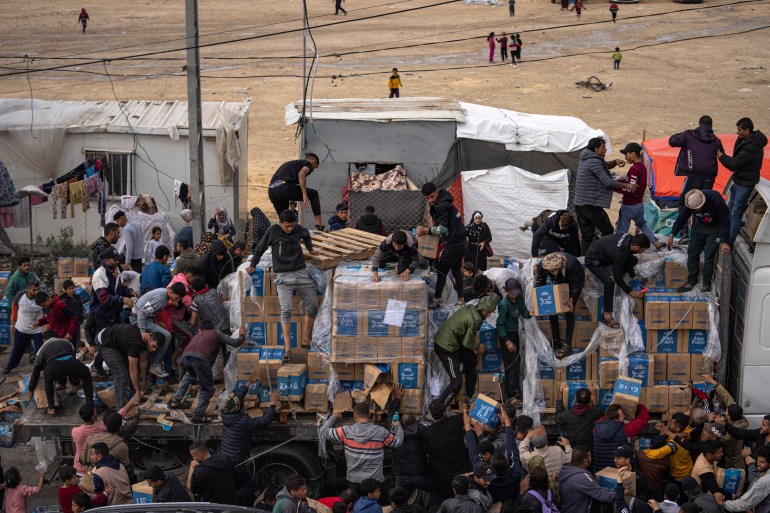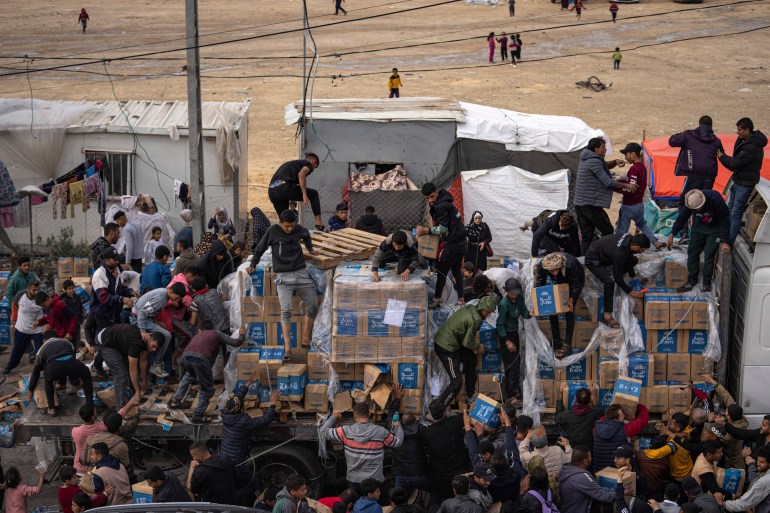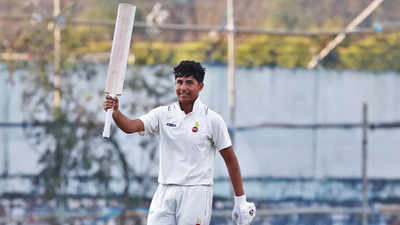Not enough aid is flowing into the strip, forcing the Palestinians into a ‘survival mode’ amid heavy Israeli attacks.
The humanitarian crisis in Gaza continues to worsen after more than two months of Israeli bombing and forced displacement of people to the enclave’s south.
On Sunday, hungry and desperate Palestinians were seen jumping onto aid trucks in order to get food and other supplies in Gaza’s Rafah area near the border with Egypt.
Dozens of Palestinians surrounded the aid trucks after they drove in through the Rafah crossing with Egypt, forcing some to stop before climbing aboard, pulling food and water boxes down, and carrying them off or passing them off to crowds below.
Some trucks appeared to be guarded by masked people carrying sticks.
“The humanitarian situation has become very desperate, not only for the residents of Rafah city but also for the one million displaced Palestinians here who are becoming hungry, thirsty and traumatised as the war pounds on,” said Al Jazeera’s Hani Mahmoud, reporting from Rafah.
Mahmoud said the amount of aid being allowed inside the strip is not enough and has forced the Palestinians into a “survival mode”.
“People are without anything – without a home, without access to food, without water and without medical supplies,” he said.
“So, the scenes at Rafah crossing are a natural response: When people starve to death, when they are hungry, this is what we will see happening.”
‘Desperate for food’
The United Nations this week warned that people in Gaza are so “desperate for food” that they are stopping aid trucks and immediately eating what they find.
Philippe Lazzarini, the head of UNRWA who visited the strip recently, said the residents, despite their long and difficult history of suffering under Israeli siege, have “never, ever experienced” hunger of this kind.
“I saw it with my eyes that people in Rafah have started to decide to help themselves directly from the truck out of total despair and eat what they have taken out of the truck on the spot,” Lazzarini said on Thursday.

On the same day, Carl Skau, the deputy head of the UN World Food Programme (WFP), confirmed that nearly half of the people in Gaza are starvingwith no idea where their next meal is coming from.
The WFP said half of Gaza’s population of 2.3 million is starving as the Israeli military’s assault on the southern part of the enclave expands and people are cut off from supplies.
Drone footage from southern Gaza on Sunday showed volunteers from the Gaza Emergency Relief prepare a giant stew.
Aid deliveries crossing into Gaza via Rafah, the sole entry point on the Egyptian border, are only a fraction of pre-conflict levels, despite the surge in needs.
Aid coming through the border crossing has been slow to deliver what the Gaza Strip population needs because of delays from truck inspections.
Rafah is sheltering more than 12,000 people per square kilometre, housing an estimated 85 percent of people displaced across Gaza since the attacks began on October 7.
That day, Hamas launched a surprise incursion on Israeli territory, killing some 1,140 people and taking another 240 captives.
Israel’s bombardment has since killed 18,787 people and injured another 50,897, while thousands are believed to be buried under the rubble.
Despite thousands sheltering at the crossing, Rafah continues to be the target of Israeli air strikes.
A massive explosion took place overnight in the Geneina district of Rafah, with two people killed and residential homes targeted and destroyed, said Al Jazeera’s Mahmoud.
“A large number of injured have been brought to the Kuwaiti hospital here,” he said. “We are talking about more than 50 people injured.”








